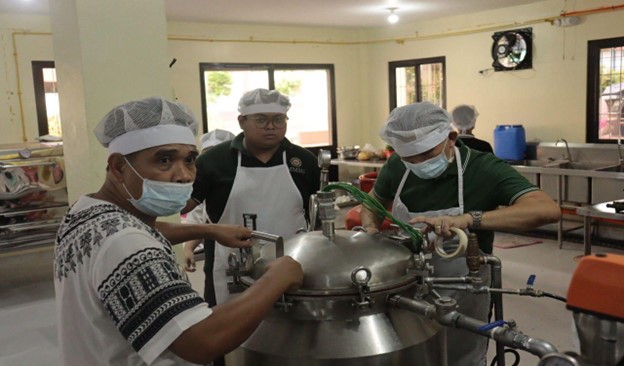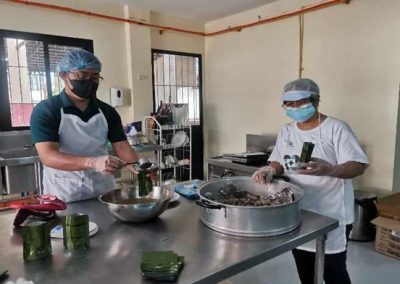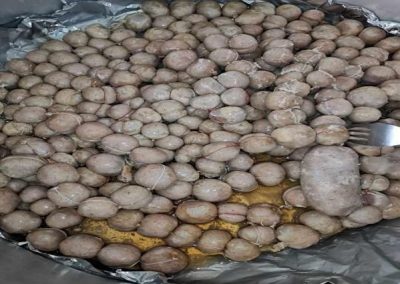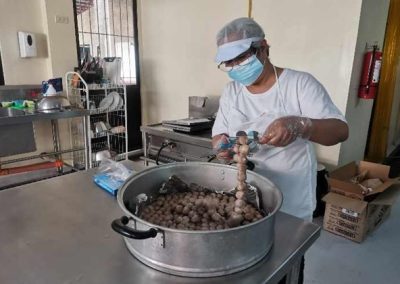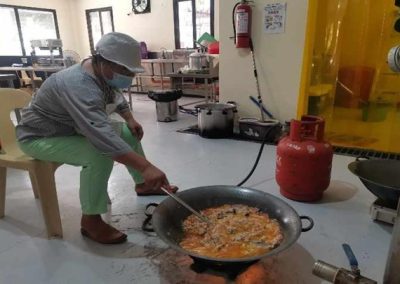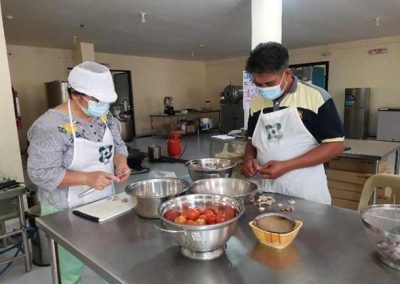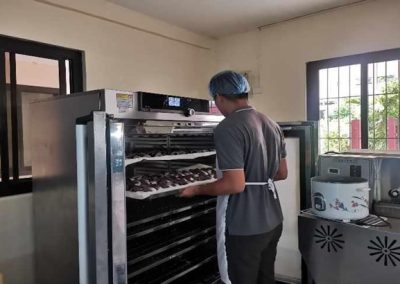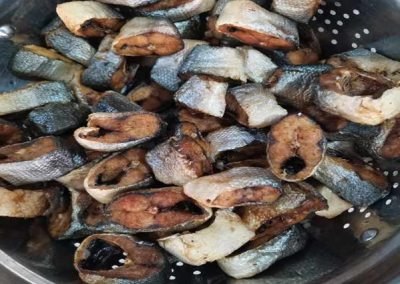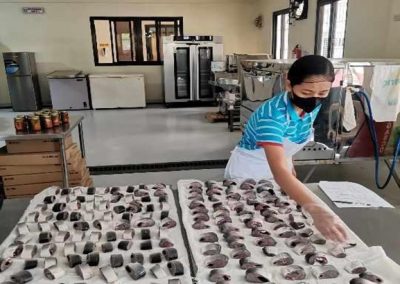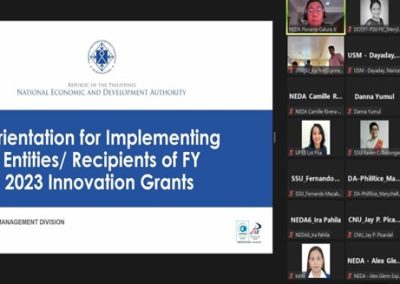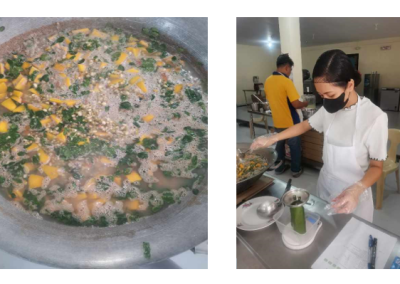The Pangasinan State University (PSU) – Department of Science and Technology Region 1 (DOST1) Food Innovation Center (FIC) has been selected as a recipient of the National Economic and Development Authority (NEDA) Innovation Grant 2023, amounting to Php 4,441,636.00. This grant marks a significant milestone in the center’s mission to advance food innovation, support local food industries, and contribute to regional economic development.
Out of 287 proposals received, 187 underwent review by the NEDA Technical Panels. Of these, 43 proposals were shortlisted for endorsement to the National Innovation Council Executive Technical Board. Of the shortlisted proposals, 25 were approved for funding and implementation, in which the PSU-DOST1 Food Innovation Center is one of the recipients.
The NEDA Innovation Grant aims to support projects that foster technological innovation and commercialization, particularly in areas that are vital to national development goals. The NEDA Innovation Grant 2023 is a government initiative designed to promote innovation across different sectors, including food, agriculture, manufacturing, and information technology. The grant is part of the Philippine Innovation Act, which aims to establish an innovation ecosystem that enhances the country’s competitiveness and supports the sustainable development of various industries. This year’s grant recipients, including the PSU-DOST1 Food Innovation Center, were selected based on their potential to deliver impactful, scalable innovations that address key national priorities such as food security, job creation, and rural development. The funding is intended to support projects that focus on improving production efficiency, product innovation, and the commercialization of new technologies, especially in industries that are crucial for the country’s economic and social development. The PSU-DOST1 FIC’s selection for this prestigious grant highlights its role as a hub for food technology innovation, aligning with national priorities in sustainability, food security, and rural development.
Collaboration and partnerships through external funding of RND projects has been one of the identified key strategy for sustainability. The center has recognized the importance of collaborating with external partners and securing funding. This achievement not only brings recognition to the center but also provides the financial resources necessary to pursue and realize the goals of the proposed RND project.
The PSU-DOST1 Food Innovation Center is a key initiative under the collaboration between Pangasinan State University (PSU) and the Department of Science and Technology (DOST) Region 1. The center serves as a research and development hub that fosters innovation in the local food sector, offering services to small and medium-sized food businesses, local farmers, and entrepreneurs.
The FIC’s primary mission is to address the challenges faced by the Philippine food industry, such as limited access to advanced food processing technology, lack of innovation in food products, and inadequate support for small-scale producers. By focusing on developing new food products, enhancing production processes, and ensuring food safety, the center aims to elevate the competitiveness of local food industries, improve food security, and contribute to sustainable agricultural practices.
With this, The PSU-DOST 1 Food Innovation Center initially conducted and developed ready-to-eat products packed in flat pouches under the SMARTFOOD project funded by the Department of Science and Technology-Regional Office 1. The developed food products can be used as ready-to-eat (RTE) convenient food packs for emergencies or disasters. These developed products are the RTE onion longganisa, RTE ginisang buro, RTE ginisang munggo, and RTE binagoongang bangus.
In addition, these products must undergo packaging optimization and thermal process validation for maximum safety during storage and consumption. The project, titled “Pilot Production, Packaging Innovation, and Safety Validation of Food Innovation Center (FIC)-Developed Disaster Foods in Region 1,” which secured a grant of Php 4,441,636.00 through the National Economic and Development Authority (NEDA) and the National Innovation Council (NIC) enables the PSU-DOST 1 Food Innovation Center to enhance the development, safety testing, and market readiness of these disaster food products, ensuring they are both effective and safe for distribution.
To maintain the quality and safety of these RTE disaster foods, the PSU-DOST 1 Food Innovation Center has prioritized packaging optimization and thermal process validation. The retortable stand-up pouch packaging design is intended to be lightweight, durable, and convenient, making it ideal for rapid distribution during emergency scenarios. Thermal process validation, including heat penetration tests, will ensure that the food remains free from pathogens and safe for consumption over an extended period, a critical factor for RTE disaster foods. The center will conduct pilot production, heat penetration tests, and laboratory tests such as microbial, sensory, nutritional evaluations, and shelf life. Pilot production is a crucial step in translating the concepts developed by the FIC into scalable, practical solutions. The pilot stage tests the feasibility of producing disaster foods on a larger scale, ensuring that the systems in place can support high-quality food production while maintaining standards of safety and efficiency.
After pilot production, packaging plays a vital role in disaster food distribution. Traditional packaging methods often fail to address the unique challenges posed by disaster scenarios, such as exposure to moisture, heat, and contamination. The FIC’s packaging innovation aims to enhance the shelf life and safety of the foods while ensuring that they are easy to distribute and consume. Lastly, safety validation must be conducted to ensure the safety of food products which is paramount, particularly in disaster relief scenarios where the risk of foodborne illness is heightened. The FIC has implemented a rigorous safety validation process to ensure that the disaster foods meet the highest safety standards. These steps are important to ensure that the products meet the highest standards for safety.
Once the products pass all necessary tests and validations, they will be distributed across Region 1 as part of a larger effort to promote disaster preparedness and the potential marketability of local disaster foods. This regional distribution will also demonstrate the practicality and effectiveness of these RTE foods, encouraging further adoption and possible collaborations to other institutions and MSMEs.
Through this project, the PSU-DOST 1 Food Innovation Center continues to fulfill its mission of delivering significant food innovations. The Pilot Production, Packaging Innovation, and Safety Validation of Disaster Foods project, represents a significant step forward in disaster food technology. The PSU-DOST 1 Food Innovation Center continues to fulfill its mission of delivering significant food innovations. With support from NEDA, NIC, and DOST-RO1, the center is likely to enhance disaster preparedness in Region 1 and establish itself as a contributor to food security in crisis situations. By developing ready-to-eat disaster foods that focus on safety, sustainability, and accessibility, the center is building a strong system for disaster relief that could guide future efforts in food innovation.By addressing the challenges of food security in emergency situations, the FIC is helping to ensure that the Philippines is better prepared to handle the growing frequency and severity of natural disasters. Through its innovative approach to food development, packaging, and safety validation, the project is laying the groundwork for a more resilient food system that not only addresses immediate disaster needs but also promotes long-term food security and innovation in the food sector.
The successful implementation of this project could have far-reaching benefits, not only in Region 1 but across the entire Philippines. It underscores the importance of collaboration between government, research institutions, and local industries to create scalable solutions that can be rapidly deployed in times of crisis.
Furthermore, it demonstrates the value of food innovation in addressing some of the most pressing challenges of the 21st century, such as climate change, food security, and disaster resilience.
As the FIC continues to refine its products and processes, the lessons learned from this project can serve as a model for other regions and countries that are grappling with similar challenges, contributing to a global movement toward more sustainable and resilient disaster relief systems.
